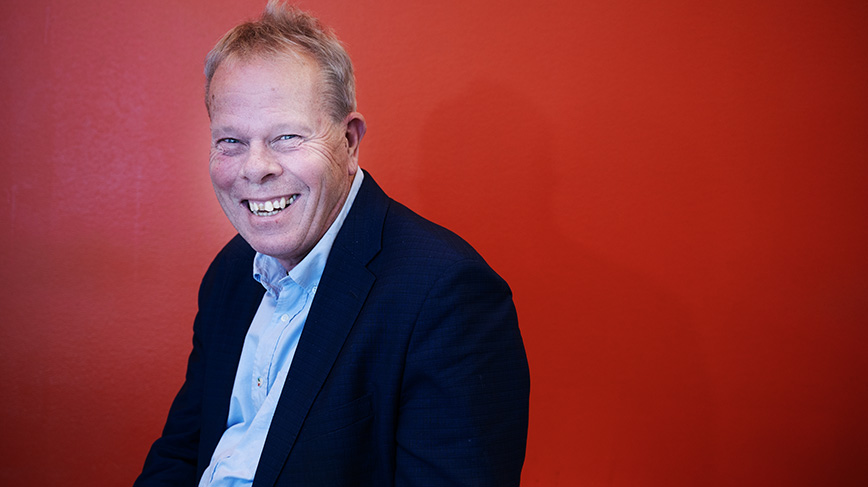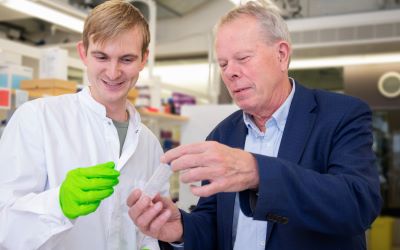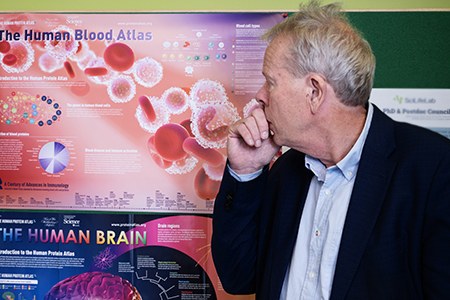In the mind of a stubborn visionary

A blood test once a year will tell you if you have a certain type of cancer in your body. This increases the chances of early detection, cure and improved survival rates.
This is researcher Mathias Uhlén's dream and vision that could become reality within ten years.
"The development of blood analyses is moving at a rapid pace and we are in a good position. It will significantly reduce human suffering and society's costs for diagnostics and treatment."
On the walls of Mathias Uhlén's room, diplomas and awards follow one another. Outside, the cars on Solnavägen are travelling at breakneck speed, as is the conversation with the professor of microbiology who is also the man behind the protein atlas, which maps 20 000 of the human body's proteins. The database, which is the second largest in the world, was created 20 years ago and has been used by researchers around the world with half a million visitors per month.
"It's probably the thing I'm most proud of in my career - the Human Protein Atlas put both Sweden and KTH Royal Institute of Technology on the map when it comes to studying human building blocks."

With the help of AI, the proteins in the blood are sorted and show patterns for the twelve most common cancers. With just one drop of blood, 3000 different tests can be performed.
"We have now started to track another 50 or so diseases, such as arthritis, MS and Alzheimer's, for example. We will present those results early next year."
No worries about AI
The use of AI and earlier machine learning to systematise, sequence and structure huge amounts of data is a prerequisite for the work and its use does not worry him much.
"Any technology can be misused, but I think there are far worse things to worry about on the planet, such as war, nuclear weapons and climate change."
As a chemistry student at KTH in the late 1970s, Mathias Uhlén never imagined that he would devote his life to protein research, antibodies and precision medicine.
"As so often, it was something of slipping on a banana skin that I was given the opportunity to set up a lab in genetic engineering. That's the way it is."
Mathias Uhlén has nearly 1000 publications, a hundred patents and 20 start-up companies under his belt. He has also supervised 120 PhD students. His research has been well funded and he is well aware that he is privileged, while saying that he has always delivered. He wakes up and goes to sleep with his projects and now he has promised his partner that he will slow down somewhat when he approaches 70 and only work 100 per cent.
"We'll see how it goes. Now I don't have any teaching anymore and can only devote myself to research - which is also wonderful."
What drives you?
"I'd say I'm a competitive person, but above all I'm almost ridiculously interested in the creative process of research and getting a good team together. Discovering things before everyone else is also appreciated."

But he also has a weakness for well-prepared and fast-paced meetings.
"I love meetings and the consensus model when they are taken seriously - then you can build great research teams with team spirit."
Have you ever failed?
"Of course,' he says, pondering for a moment. 'In the late 80s, I built a technology to analyse genetic material. The idea was right, but the molecule we used was wrong. That makes me a little bit sad."
Do you dream of a Nobel Prize?
"Well, I think it would be very dangerous to have that in mind as a researcher. If our research with protein profiling and a simple blood test becomes reality, it would be a revolution. That goes a long way."
Text: Jill Klackenberg
Photo: Theresia Köhlin

